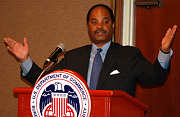Apr
16
BIS Announces New Penalty Policies
 Posted by Clif Burns at 7:00 pm on April 16, 2007
Posted by Clif Burns at 7:00 pm on April 16, 2007
 Category: BIS
Category: BIS
 The remarks of Assistant Secretary Darryl Jackson of the Bureau of Industry and Security at the West Coast update conference in March were just posted on the BIS website. Most of the remarks were predictable big-stick waving from BIS with threats of increased enforcement and enhanced penalties.
The remarks of Assistant Secretary Darryl Jackson of the Bureau of Industry and Security at the West Coast update conference in March were just posted on the BIS website. Most of the remarks were predictable big-stick waving from BIS with threats of increased enforcement and enhanced penalties.
But these remarks were somewhat more conciliatory:
I am very pleased today to announce publicly for the first time that BIS will shortly implement refined practices for the charging and settlement of administrative enforcement cases brought under the new PATRIOT Act provisions. . . . As you will hear in more detail from the Enforcement Panel, in cases to which the higher penalties apply that settle before issuance of a charging letter, BIS will only charge the most serious violation per transaction.
We have complained before (see here for example) about BIS’s tendency to charge single transactions as multiple violations in order to increase penalties imposed upon those making voluntary disclosures. Assistant Secretary’s remarks suggest that BIS may be retreating from that policy.
 Permalink
Permalink
Copyright © 2007 Clif Burns. All Rights Reserved.
(No republication, syndication or use permitted without my consent.)
4 Comments:

Yeah but…In further remarks (Wendy Wysong?) acknowledeged that they charged on multiple counts for one instance because they wanted to get the money up and make it hurt when a violation occurs. It was further pointed out that the Patriot Act allowed for greater penalties. More or less a wash.

That doesn’t surprise me, frankly. I was surprised by Jackson’s published remarks. What one hand giveth, the other hand taketh away . . .

These kinds of “declarations” have the tendency to send all of the first time attendees running back to their offices to hide underneath their desks. For seasoned veterans of any BIS engagement, it is simply the same ole thing…….

As someone who spent a significant portion of my mispent youth on the Dark Side, i.e., enforcement, whatever they say about forbearing multiple violations will fall by the wayside with the desire and pressure to bump up their body count. Note that Mr. Jackson speak only ion terms of pre-charging settlement agreements: Read between the lines, this means that pre-charging letters and such will still threaten multiple violations, all potentially at the max. This is just a strong arm tactic to ensure that respondents cave-in rather than seek review of those nagging questions, such as how a clear act of Congress establishing a termination date can qualify as an extraordinary threat originating outside the United States. As four justices noted in Regan v. Walsh, IEEPA was never intended as ongoing authority for managing ongoing disputes with foreign countries, but only for emergencies. While the government cites some vague language in the House report as authority for using IEEPA when the EAA expires, the floor manager’s statement during the full committee mark-up is explicitly to the contrary (the government’s failure to cite it in Quinn is a clear ethical violation). Likewise, amendment of 1705 without adding anything to suggest authority for denial orders again suggests the Bush political appointees are out to lunch.
 The remarks of Assistant Secretary Darryl Jackson of the Bureau of Industry and Security at the West Coast update conference in March were just posted on the BIS website. Most of the remarks were predictable big-stick waving from BIS with threats of increased enforcement and enhanced penalties.
The remarks of Assistant Secretary Darryl Jackson of the Bureau of Industry and Security at the West Coast update conference in March were just posted on the BIS website. Most of the remarks were predictable big-stick waving from BIS with threats of increased enforcement and enhanced penalties.  Permalink
Permalink

 Posted by
Posted by  Category:
Category: 

